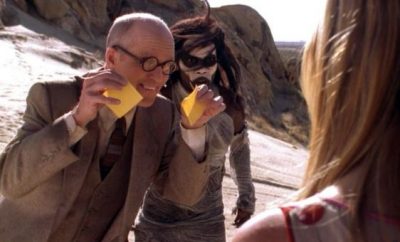What’s a redemption arc, anyway?
…Something to talk about instead of the pandemic, that’s what.

Occasionally, in my fannish lurkage, I see things cross my ken that confuse me, because it seems like half the conversation is missing and I could have sworn it was common currency ten minutes ago.
Today’s case in point: “redemption arcs.” Should a character be given a redemption arc? goes the debate. What makes a good redemption arc? Why don’t people like them? Is there a point of no return for a character, after which no morally-solvent story redeems them?
And all this debate is being conducted as if nobody ever heard the term “woobie.” Maybe I should do a series on the Fandom Old Lexicon.
For those of you just tuning in, a “woobie” is a Bad Guy Character that gathers a contingent of fans who love them so much they’d like to hug and kiss and squeeze them and call them George. Such fans get defensive when the Woobie is criticized, either on behalf of the character or in response to implied criticism of themselves for liking the character so unreservedly.
It’s hard to predict what characters get “woobified” — sometimes fans light upon an otherwise uninspiring antagonist character and festoon them with personality quirks or backstories or leather pants, out of all recognition to the source. Sometimes, though, one sees characters that are practically written to be woobie-bait, and sure enough, they get the fan base that canon was trolling for.
It’s the woobie dynamic that is being addressed when people talk about “redemption arcs” nowadays, I think. Only in the current climate, we have to talk about it not only as if the adorers of antagonists are somehow painfully unaware that the character is Bad, but that the only way to justify liking them is if they redeem themselves by the end of the story, like it’s somehow Cheating if a character is liked by fans without that.
And look, I get it. The Woob is not my jam — or the conditions under which I will woobify a character are extremely narrow and idiosyncratic. I’ve been known to be critical of woobifying as well as the woobies that receive the treatment. But “redemption arc” means something much more technical to me than “way of justifying a woobie’s existence.”
A “redemption” “arc” is exactly that — a trajectory in the story (which all significant characters should have) that starts in one place and ends in another, forms an essential contribution to the story’s moral imperative, and takes place primarily in the arena of the character’s own psyche. Redemption is wrought by and within the character being redeemed. And the significance of this work is something that the author is crafting on purpose, for their ultimate aims for the story as a whole.
The response of other characters to the redeemed character’s trajectory is something else entirely. I’ve said before that we often talk like redemption is bestowed and grace is earned, when it really should be the other way around. Redemption is earned. Grace is bestowed. Which means the other characters rightfully have the option of not bestowing it. It all depends on what story you’re trying to tell.
Once when a reader talked to me of Barklay in near-woobifying terms, I thought to myself: “Oh dear.” Because on the one hand, yes! I did hope to achieve a character that exerts a compelling interest! And part of the point of Barklay is to portray what kind of work redemption really is — its pitfalls, its blindnesses, its backslidings, its threat to the person’s stable self-image. On the other hand, Barklay isn’t meant to be the central figure in Ryswyck — except, technically speaking, as a MacGuffin for the other characters’ arcs. As a character he’s just…someone the main characters find difficult to love and also can’t help loving; someone about whom they ask, Am I cheating the universe and myself if I give grace to him?
To me, personally, that’s the far more interesting question. And if a “redemption arc” were something arbitrarily bestowed, you could hardly even ask it. Which is why, paradoxically, my instinct is to let woobifying fans have their fun. No: you don’t have to justify being fannish about a Bad Guy by trying to anticipate a story arc in which they make up for all their badnesses and either are welcomed back into the fold or die covered in a hero’s glory. Unless that’s what floats your boat, of course. Give them leather pants by all means. Draw them glaring from under the fold of their cloak, with the tiger’s eye that knows nothing of repentance. Fly! Be freeee!
And now for my afternoon cup of calming tea.








